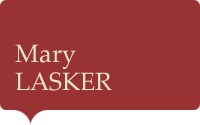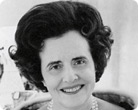Mary Woodward Lasker's interviewer was John T. Mason Jr., who, after service as a captain in the United States Navy in the Second World War and years of service as an Episcopal priest in parishes in New Jersey and New York, was asked by Louis Starr to undertake interviews for the Oral History Research Office. Mason conducted a series of interviews on World War II naval history for the Office and eventually became the first director of the Oral History Program of the Naval Institute. The Lasker interview began in 1962. The last session was recorded in 1982. The interviews, which shift focus over the course of time, are somewhat muted by the close relationship that develops between the interviewer and the interviewee. The interview is especially remarkable for the ways in which Lasker interweaves the testimony of her public life with descriptions of her social life and wide array of friends and acquaintances, perhaps suggesting the necessary interaction of the political and the personal for someone who devoted her life to lobbying for medical research funding. It is interesting to consider the way in which the interviewer's questions guide the testimony while remaining surprisingly unobtrusive, and the way in which the later interviews focus on events of recent months (or the past year at most) , thus transforming the interview into a form of debriefing.
Interview Excerpt
In 1971, Mary Lasker lobbied members of Congress and President Nixon in support of a cancer institute that would be separate from the National
Institutes of Health. Read Lasker's discussion of her efforts to gain support for this bill.
![]() Read transcript
Read transcript















